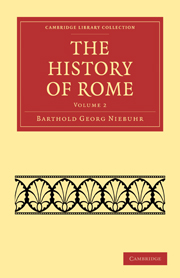Book contents
- Frontmatter
- PREFACE
- Contents
- INTRODUCTION
- The Latin State
- The League with the Latins
- Of the Colonies
- On the Rights of Isopolity and Municipium
- On the Franchise of the Latins
- The League with the Hernicans
- The Wars with the Volscians and Æquians, down to the end of the Veientine War
- The Office of Warden of the City
- The Internal Feuds of the Patricians
- Of the Public Land and its Occupation
- The Assignments of Land before the time of Sp. Cassius
- The Agrarian Law of Sp. Cassius, and his Death
- The seven Consulships of the Fabii
- The Veientine War
- Internal History from the Destruction of the Fabii to the first Pestilence
- The Legend of Coriolanus
- The Wars with the Volscians and Æquians down to the Peace of 295
- The Æquian War down to the Decemvirate
- Disasters and extraordinary Phenomena
- Civil History of the eleven Years preceding the Decemvirate
- The first Decemvirs, and their Laws
- The second Decemvirate
- The first Year after the Restoration of Freedom
- Civil Commotions down to the Constitution of 311
- The Consular Military Tribunate
- The Censorship
- Civil Affairs from the Year 311 down to the last Veientine War
- On the Pay of the Troops
- The Wars down to the Last with Veii
- The last War with Veii
- The other Wars down to that with the Gauls
- Internal History down to the War with the Gauls
- Physical History from 305 to 365
- On the Gauls, and their Immigration into Italy
- The War with the Gauls, and the Taking of Rome
- On the Olympiad and Year of the Taking of Rome
- Rome after the Departure of the Gauls
- The Wars down to the Reform of 384
- Civil History down to the Year 374
- Appendix I On the Roman Mode of Partitioning Landed Property, and on the Limitatio
- Appendix II On the Agrimensores
Internal History from the Destruction of the Fabii to the first Pestilence
Published online by Cambridge University Press: 01 June 2011
- Frontmatter
- PREFACE
- Contents
- INTRODUCTION
- The Latin State
- The League with the Latins
- Of the Colonies
- On the Rights of Isopolity and Municipium
- On the Franchise of the Latins
- The League with the Hernicans
- The Wars with the Volscians and Æquians, down to the end of the Veientine War
- The Office of Warden of the City
- The Internal Feuds of the Patricians
- Of the Public Land and its Occupation
- The Assignments of Land before the time of Sp. Cassius
- The Agrarian Law of Sp. Cassius, and his Death
- The seven Consulships of the Fabii
- The Veientine War
- Internal History from the Destruction of the Fabii to the first Pestilence
- The Legend of Coriolanus
- The Wars with the Volscians and Æquians down to the Peace of 295
- The Æquian War down to the Decemvirate
- Disasters and extraordinary Phenomena
- Civil History of the eleven Years preceding the Decemvirate
- The first Decemvirs, and their Laws
- The second Decemvirate
- The first Year after the Restoration of Freedom
- Civil Commotions down to the Constitution of 311
- The Consular Military Tribunate
- The Censorship
- Civil Affairs from the Year 311 down to the last Veientine War
- On the Pay of the Troops
- The Wars down to the Last with Veii
- The last War with Veii
- The other Wars down to that with the Gauls
- Internal History down to the War with the Gauls
- Physical History from 305 to 365
- On the Gauls, and their Immigration into Italy
- The War with the Gauls, and the Taking of Rome
- On the Olympiad and Year of the Taking of Rome
- Rome after the Departure of the Gauls
- The Wars down to the Reform of 384
- Civil History down to the Year 374
- Appendix I On the Roman Mode of Partitioning Landed Property, and on the Limitatio
- Appendix II On the Agrimensores
Summary
As soon as the pressing danger was removed, two of the tribunes impeacht the former consul T. Menenius for having left the Fabii without assistance. Their object was merely to get a declaration of his being guilty, not to take vengeance on an offender in behalf of whom his father's memory pleaded: hence the penalty was fixt at only two thousand ases, not more than a knight's yearly pay; and a sum many times as large would have been raised by his gentiles and clients. Thus far therefore his condemnation was of no importance: and in times of distraction such a sentence, pronounced by a court governed by the spirit of the opposite faction, rather raises a man in the estimation of his own. Hence we are perplext to find that it broke the heart of Menenius: he shut himself up in his house and died of grief. But it is no less incomprehensible that the tribunes should have been able to accuse him before the tribunal of their order for a matter not affecting its rights: though we may easily suppose that they brought their charge before the curies. And if these sacrificed him, for the sake of washing off their own guilt, if with vulgar thoughtlessness they estimated the sentence by the insignificance of the penalty, we can conceive that Menenius, who may have known that many of his judges, as far as wishes and commands went, were more culpable than he, should have sunk under his shame.
- Type
- Chapter
- Information
- The History of Rome , pp. 206 - 233Publisher: Cambridge University PressPrint publication year: 2010First published in: 1832

